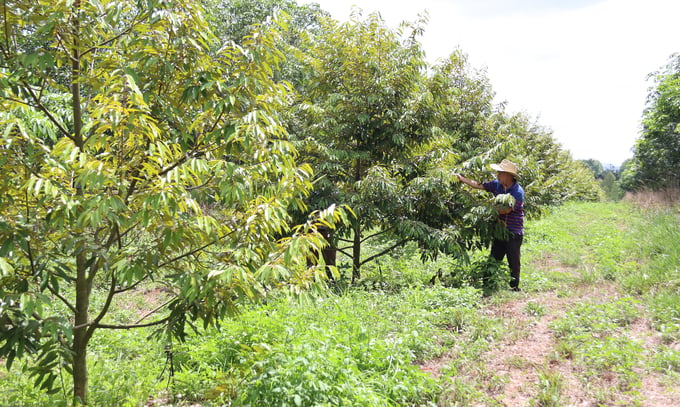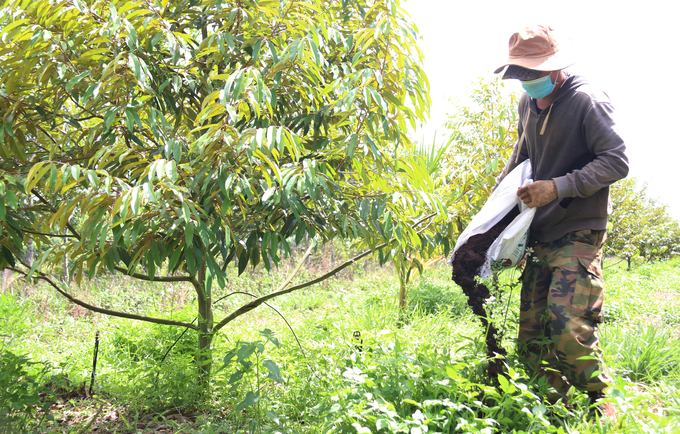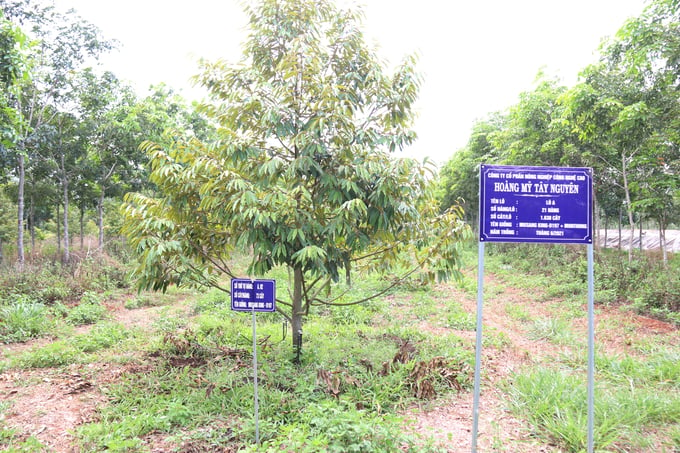May 17, 2025 | 18:24 GMT +7
May 17, 2025 | 18:24 GMT +7
Hotline: 0913.378.918
May 17, 2025 | 18:24 GMT +7
Hotline: 0913.378.918
Nearly 10,000 durian trees in Chu Kpo commune, Krong Buk district, Dak Lak province, owned by Hoang My Tay Nguyen High-Tech Agriculture Joint Stock Company, were recently assigned with QR codes. These durian trees are intercropped with rubber trees in straight rows. At the beginning of each row, the company installed signs to indicate the row number, tree number, and durian variety. Notably, each durian tree is assigned with a QR code that contains comprehensive information pertaining to its various stages of production.
According to Tran Kim Tien, General Director of Hoang My Tay Nguyen High-Tech Agriculture, the company-owned durian trees are currently entering their third year of the organic production process, featuring two main varieties: Dona and Musangking.

Hoang My Tay Nguyen High-Tech Agriculture Joint Stock Company has assigned QR codes to nearly 10,000 durian trees in Dak Lak province. Photo: Quang Yen.
According to General Director Tien, the company has collaborated with Enviva Technology Consulting Joint Stock Company to implement the durian tree digitization program. This initiative marks a significant milestone in the development of a smart agriculture model.
“We believe that integrating technology into agriculture is not only the appropriate development direction, but also the key to unlocking opportunities and sustainable development. The program goes beyond digitizing durian tree management; it aims to foster a community of innovative farmers adaptable to change and to establish a Vietnamese durian brand in the international market.
The assignment of QR codes will facilitate the traceability, locating, and 'personalization' of each durian tree. This initiative aims to establish credibility and increase the value of Vietnamese durian products. The digital care log will document the entire growth process of the trees, enabling transparent quality assessment,” shared General Director Tien.

Each durian tree is tagged with a QR code that contains all production information. Photo: Quang Yen.
According to General Director Tien, the company will develop beyond digitizing durian tree management to explore significant future agricultural prospects. “In the near future, we plan to assign QR codes to an additional 300,000 durian trees. Our goal is to build a comprehensive ecosystem to support and develop Vietnamese durian trees,” General Director Tien emphasized. He added that the digitization of durian tree production management in Vietnam will promote transparent production and consumption, as well as facilitate gradual access to the carbon credit market.
“The carbon credit market is slowly becoming the key focus of the global economy. The government is currently prioritizing the tasks of reducing carbon emissions, promoting low-emission farming to protect the environment, and bringing benefits to producers,” Mr. Tien further noted.
In addition to the implementation of QR codes for durian trees, Hoang My Tay Nguyen High-Tech Agriculture Company is collaborating with Enviva Technology Consulting Company to establish a durian trading platform, which represents a breakthrough for the durian industry.
The trading platform is a digital application utilizing Blockchain technology to digitize durian tree production management and traceability. It also aims to connect Vietnamese durian commerce with other countries around the world; advertise and exchange consumable materials for durian production such as fertilizers and pesticides; and create a network of experts for training and implementing durian care procedures. Additionally, the platform facilitates connection between labor resources in the durian industry.

Hoang My Tay Nguyen High-Tech Agriculture Company planted nearly 10,000 durian trees organically. Photo: Quang Yen.
According to General Director Tien, the application of digital technology is present throughout the entire durian tree production process. Furthermore, the various production stages are regularly updated on the digital platform.
"In the future, a digital log will be used to monitor the quantity of fruits on each durian tree as well as their production methods. The future trading platform aims to support large-scale durian farms and businesses nationwide. When listed on the platform, businesses looking to purchase durians can directly contact farmers without the need for intermediaries. This direct connection reduces costs, increases profits for farmers, and enhances purchasing benefits for the businesses," General Director Tien commented on the advantages of the digital platform.
General Director Tien further emphasized that digital transformation in durian production and trading plays a crucial role in restructuring the industry towards modernization, value added, and sustainability; thereby affirming its value in the international market.
Digital transformation is an essential solution that enables farmers and agricultural businesses to produce high-quality products at optimal costs and achieve maximum profits. This objective has received concerted attention and effort from various sectors, local governments, businesses, and individuals, with the expectation of achieving breakthroughs in productivity, quality, and competitiveness for agricultural products.
"The trading platform will act as a marketplace and a key gateway to the international market, where the demand for high-quality agricultural products is rapidly increasing. This technology presents significant opportunities for expanding international trade relationships and business development," General Director remarked.

In addition to digitizing the production process, Hoang My Tay Nguyen High-Tech Agriculture Company is currently implementing the construction of an electronic durian trading platform. Photo: Quang Yen.
Vu Duc Con, Chairman of the Durian Association of Dak Lak, reported that the local durian industry has faced considerable challenges in recent years. Consequently, the failure to respond by government agencies and relevant sectors will pose a significant impact on sustainable development.
According to Chairman Con, transparency is crucial to the sustainable development of the durian industry. "Transparency will help us gain the confidence of consumers and importing countries. Transparency encourages producers to assume responsibility; those who perform inadequately will be exposed, while those who excel will gain recognition. Digitization stands as a fundamental prerequisite for transparency. Through the implementation of digital farming management, product quality will be effectively demonstrated," Chairman Con highlighted his viewpoint.
Nguyen Hoai Duong, General Director of the Dak Lak province's Department of Agriculture and Rural Development, stated that the province has identified digital transformation in agriculture as a process of adjusting production models with technology as the foundation. Additionally, digital transformation plays an indispensable role in restructuring the province's agricultural sector.
The Department has actively promoted and supported the local community and businesses in accessing and applying digital technology to production, trading, and product consumption activities. At present, many local farmers have adopted advanced production methods, thereby enhancing their capacity for production managment and monitoring.
"We have also proposed the province to develop a plan that systemize necessary tasks and promote digital transformation in agriculture to apply them appropriately in production and management practices," General Director Duong shared.
Translated by Nguyen Hai Long

(VAN) Muong Nhe Nature Reserve hopes that being upgraded to a national park will lay the foundation for forest protection efforts to be carried out in a systematic, modern, and sustainable manner.
/2025/05/16/3923-2-171845_52.jpg)
(VAN) Lower costs, higher yields, and improved soil quality are outstanding benefits that soybeans bring when integrated into the crop rotation system.

(VAN) The 'For a Green National Environment' programme aims to promote a green lifestyle, support businesses in implementing ESG practices, and turn Net Zero commitments into concrete actions.

(VAN) Cold-barn systems efficiently manage environmental and temperature conditions, which aids in the prevention of respiratory diseases in pigs and protects them from the vectors that transmit African swine fevers.

(VAN) To tackle challenges, the project 'Addressing key technical bottlenecks in the grouper supply chain in Vietnam' has been underway since 2024.

(VAN) The project 'Disease-Resilient and Sustainable Cassava Production Systems in the Mekong Region', funded by the Australian Center for International Agricultural Research (ACIAR), is being implemented from 2024 to 2028.

(VAN) Data from 10,000 farming households will help professionalize production organization and support the implementation of the One Million Hectares Program for High-Quality, Low-Emission Rice Cultivation.